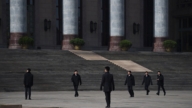【新唐人2013年03月13日讯】中共国务委员兼国务院秘书长马凯10号表示,为预防及惩治贪腐,中国大陆将建立“不动产统一登记”制度,以公民身份证号码和组织机构代码为基础,建立统一的社会信用代码。但许多专家学者认为,这个举措可能对反腐败有益,但是不是反腐败的根本措施。
马凯是在说明“国务院机构改革和职能转变方案”时提出这项计划。有网友认为,这代表个人名下的不动产将会全国联网。
而“中央民族大学”哲学和宗教学系教授赵士林认为,这样一些措施有利于信息公开透明,有利于反腐败。但是,赵士林说,根本上还是要通过政治体制改革,把政治运作透明化、权力公开化来限制权力。
中央民族大学哲学和宗教学系教授赵士林:“比如审判权,行政审批权,因为涉及到不动产信息这样一些问题。这个举措固然重要,但是根本上解决房地产问题,还是应该靠解决土地财政的问题,政府不能手里把着土地作为财源,这是中国房地产泡沫乃至高房价,乃至整个房地产腐败的最根本原因。如果从这个角度来解决问题,比如从土地私有化,农民真的掌握土地等等,这样一些层面来解决问题的话,那么房地产腐败也好,房地产泡沫也好,才能真正解决。”
“北京大学”法学院教授张千帆则认为,这是建立中国社会信用体系的一个步骤,对于打击腐败还是有益的。
北京大学法学院教授张千帆:“因为现在对于贪官来说,银行有多少账户,有多少套房子,当然有一些登记,但是估计有很多是没有登记,所以说要查处确实也是有一些技术上的困难。所以这个举措应该说对防治腐败来说应该还是有用的。”
“中国人民大学”政治学教授张鸣表示,这个举措是学习美国的经验,可以进一步完善公民信息,确实对反腐败有一定效果,可能对取消户籍制度也有一些好处。但是,张鸣说,这种做法应该伴随政治民主化,才能防止变成为加强控制公民的一种手段。
中国人民大学政治学教授张鸣:“目前看还是好事。但是我担心它会……如果政治不民主化的话,这种信息加强控制,对你的信息进一步网络化,电子化的控制,可能会导致对公民的自由有可能是一种伤害。但是现在我主要肯定它这种做法。因为这种做法可能有助于户籍制度的改革,以及对官员财产的跟踪。”
不过,赵士林还表示,在目前中共的体制下,任何政策的出台,权贵都可能有办法逃避。
赵士林:“一个是中央政令不畅通。马凯这样讲了,中央这样讲了,地方政府它还有很多办法。它通过比如隐瞒信息,或通过其他一些变通的办法,或甚至通过一些很下流的手段,来回避,来规避,或冲淡,或扭曲,使这些举措的边际效应递减。非常可能。”
赵士林说明,中央和地方政令不畅通,最根本的原因就是政治体制改革不到位,而使得权力永远超越法律、法规,那么,制定法律和法规本身的意义何在?他说,因为有超越法律的权力,法律因此被制约、扭曲,甚至被阉割。
虽然,中国最高人民检察院检察长曹建明周日表示,过去5年,检察机关共立案侦查16万多件贪污贿赂案,涉案者21万多人,其中包括30名省部级以上官员。但,这可能只是冰山的一角,更大面积的腐败仍被掩盖在水面以下。
采访编辑/秦雪 后制/萧宇
Chinese Communist Party (CCP) Plans to Release Unified
Real Estate Registration System
On March 10th, Chinese Communist Party (CCP) State Council
Member and State Council Secretary-General Ma Kai said
for prevention and punishment of corruption,
China will establish a real estate unified registration system.
This will have unified credit codes based on
citizen ID and organizations.
Many experts and scholars believe this move
might be good against corruption.
However it is not a fundamental anti-corruption measure.
Ma Kai brought up this plan while explaining the “State Council
Institutional Reform & Transformation Program."
Some netizens think this means personal real estate properties
will be put on the internet.
Zhao Shilin, Professor of Philosophy and Religious Studies
at Minzu University of China gave his views:
He thinks such measures help make information transparent
and good for anti-corruption.
However, Professor Zhao says the fundamental measure
is to ensure or political operation transparency and limit powers through political system reform.
Zhao Shilin: “Judicial administrative rights and approval rights
are all related with real estate information.
This measure is very important.
However, the real estate problem depends on finance of land.
The government should not treat land as the source of revenue.
This is the most fundamental reason for China’s real estate
bubble, high prices, and the whole real estate corruption.
If the government solves the issue using privatization of land
and letting farmers have the land, the corruption or the real estate bubble will be really solved.”
Beijing University Law School Professor Zhang Qianfan
thinks this is a step towards the establishment of China’s
social credit system, useful in the fight against corruption.
Zhang Qianfan: “Currently there is some kind of registration
of bank accounts and real estate properties for corrupt officials.
However many are not registered.
Therefore there are technical difficulties in investigating them.
So this initiative should be useful in the fight against corruption.”
Professor of political science at Remin University of China
Zhang Ming said this is learned from the US.
It improves the citizens’ information, can have real effects
on anti-corruption, and can possibly help the abolition of the household registration system.
However, Zhang Ming said this practice should be accompanied
by political democratization, to stop it being a means of control.
Zhang Ming: “At the moment it is still a good practice.
But I am worried that it will …without political democratization,
cause damage to citizens’ freedoms by controlling people’s data.
But now I mainly agree with this practice, because they may
contribute to the reform of the household registration system, as well as tracking officials’ properties.”
However, Zhao Shilin also said that in the CCP system,
those in power can find ways to escape from any policy.
Zhao Shilin: “The decree might not be smoothly implemented.
There are many ways local governments act, such as holding
back information, or some other spiteful ways.
This has the effect of to evading, diluting or distorting the
practice which diminishes its effectiveness."
Zhao Shilin explained that the most fundamental reason for
implementation failure lies in its political system.
With power always beyond the law and regulations,
what is the purpose of making laws and regulations?
He said due to power being above the law,
the law is therefore restricted and distorted.
Leader of Chinese Supreme People’s Procuratorate
Cao Jianming speaking on Sunday,
said in the past five years, prosecutors have filed over
60,000 cases of embezzlement and bribery,
involving 210,000 people with over 30 provincial
and ministerial level officials.
But this may be just the tip of the iceberg, and a much larger
scale of corruption is still lurking below the surface.






























